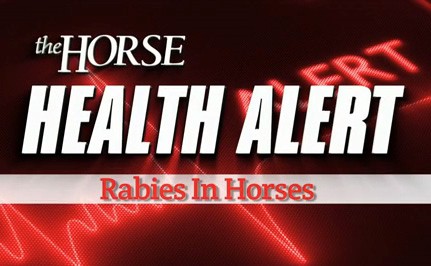Colorado Confirms Second Equid Rabies Case for 2021

On June 3, officials at the Colorado Department of Agriculture and Public Health and Environment (CDA), in collaboration with Tri-County Health Department, confirmed a Miniature Horse in Adams County with rabies. The 12-year-old equine presented on May 25 with clinical signs that included ataxia (incoordination), depression, mild fever, weakness, and neurologic symptoms. The horse, which had not been vaccinated, was euthanized.
Shortly after the mini was euthanized, a skunk found on the premises acting strangely was euthanized and also tested positive.
“This incident highlights the need for two important things,” said State Veterinarian Maggie Baldwin, DVM in a statement, “reporting suspect rabies cases and up-to-date vaccinations. Prompt reporting of suspect cases allows for timely diagnosis and appropriate follow-up measures to protect animal and human health. Vaccinating pets and livestock is the single best method to prevent the disease, which is fatal in nearly 100% of the cases.”
The miniature horse is the state’s second equid case in 2021; the first was a mule in Eagle County that was confirmed in January. Prior to this year, the last equine rabies case in the state was documented in 2013.
Rabies 101
Rabies—a zoonotic disease that can be spread from animals to humans—is caused by a lyssavirus that affects the neurologic system and salivary glands. Horses are exposed most commonly through the bite of another rabid animal.

In horses, clinical signs of rabies are variable and can take up to 12 weeks to appear after the initial infection. Although affected horses are sometimes asymptomatic, an infected horse can show behavioral changes such as drowsiness, depression, fear, or aggression. Once clinical signs appear, there are no treatment options.
Rabies can only be diagnosed postmortem by submitting the horse’s head to a local public health laboratory to identify the rabies virus using a test called fluorescence antibody. Thus, ruling out all other potential diseases first is very important in these cases to avoid potentially unnecessary euthanasia.
Because rabies threatens both horses and the humans who handle them, the American Association of Equine Practitioners (AAEP) recommends rabies as a core vaccine every U.S. horse should receive. The AAEP’s vaccination guidelines recommend that adult horses receive an initial single dose and a booster vaccination annually; foals born to vaccinated mares should receive a first vaccine dose no earlier than at six month of age and a second dose four to six weeks later followed by annual vaccination; and foals of unvaccinated mares should receive a first vaccine dose at three or four months of age and should be revaccinated annually.
Written by:
Edited Press Release
Related Articles
Stay on top of the most recent Horse Health news with















